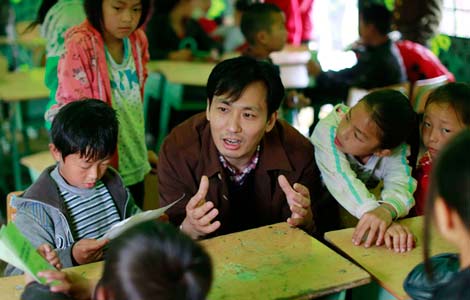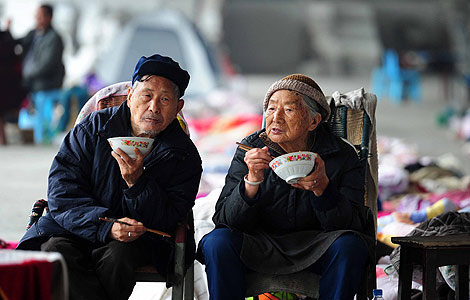Four new H7N9 cases
Updated: 2013-04-24 07:58
By Wang Qingyun and Jin Zhu (China Daily)
|
||||||||
Shandong province confirmed its first case of H7N9 infection on Tuesday after a 36-year-old man with a cough and fever was hospitalized in Zaozhuang on Sunday.
The man is in critical condition. Nine people who were in close contact with him have not shown related symptoms.
There were three other new H7N9 cases confirmed on Tuesday, two in Zhejiang province and the other in Anhui province.
By 4 pm on Tuesday, 108 people had been infected with the virus in China, 22 of whom had died.
The Harbin Veterinary Research Institute under the Chinese Academy of Agricultural Sciences on Tuesday reported that the H7N9 virus isolated from live poultry markets in China is closely related to the viruses that caused the recent human infections.
For the first time, the institute identified the direct avian origin of the H7N9 influenza viruses that caused the human infections, which may provide an important basis for controlling the virus in the future, the institute said.
"It is now imperative to discover how the virus is transmitted among animals, and to develop effective vaccines and antiviral drugs to control it," said Chen Hualan, a researcher from the institute.
The Ministry of Agriculture has found 38 poultry samples containing the virus from live poultry markets in Shanghai, Anhui, Jiangsu, and Zhejiang.
Besides that, a wild pigeon and a carrier pigeon from a farm in Jiangsu also tested positive for the H7N9 virus, according to the ministry.
To combat the disease, Beijing has set aside 3 million yuan ($485,000) for Ditan and Youan hospitals, which have been designated to treat and hospitalize H7N9 patients in the city. The funds are for buying medical supplies and paying for H7N9 patients' medical expenses in advance.
To lower the possible burden of medical expenses for rural residents, the city also stipulated that insurance for these residents should cover cases of H7N9 infection that need hospitalization, and reimburse at most 75 percent of the medical expenses caused by hospitalization. Hospitals should pay in advance for the patient when insurance agencies cannot reimburse the expenses on site.
In Anhui, rural residents with severe infections that require hospitalization can get a maximum reimbursement of 80 percent of their medical fees, and those with less severe infections can get 70 percent of their medical fees reimbursed.
Shandong authorities have included H7N9 infection in medical insurance for rural residents.
Guangdong, where no infections have been discovered, has set up a fund of 30 million yuan to control and treat possible infections, and to help cover medical expenses when patients are unable to pay.
The Ministry of Human Resources and Social Security issued a statement on Monday allowing provinces to provide more reimbursement for H7N9 treatment than is allowed under local policies, should patients be hospitalized under special circumstances or if they require medication that is not normally reimbursable.
Contact the writers at wangqingyun@chinadaily.com.cn and jinzhu@chinadaily.com.cn
(China Daily 04/24/2013 page2)

 Children gathered together as healing process begins
Children gathered together as healing process begins
 Fears surface after hippo kills tourist from Shanghai
Fears surface after hippo kills tourist from Shanghai
 Rescuers win people’s hearts
Rescuers win people’s hearts
 Law to curb tourism price hikes
Law to curb tourism price hikes
 House damaged, life continues in Sichuan
House damaged, life continues in Sichuan
 Relief reaches isolated village
Relief reaches isolated village
 Rainfall poses new threats to quake-hit region
Rainfall poses new threats to quake-hit region
 Funerals begin for Boston bombing victims
Funerals begin for Boston bombing victims
Most Viewed
Editor's Picks

|

|

|

|

|

|
Today's Top News
Industry faces recovery fight
China's 2nd aircraft carrier will be 'larger'
China thanks countries
for quake relief aid
China, US to enhance mutual trust
Beijing protests Diaoyu incident
Copyrights take a bite out of Apple
Four new H7N9 cases
Landslide kills 9 in SW China
US Weekly

|

|






